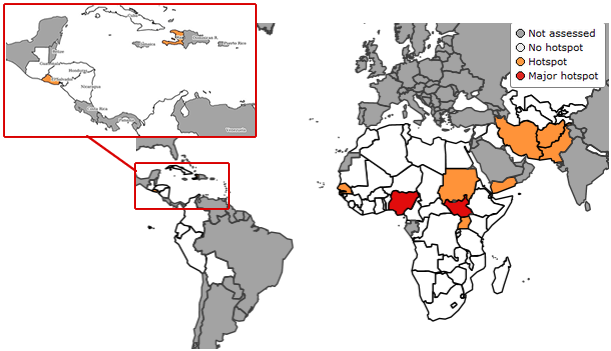
The September edition of the JRC's Anomaly Hotspots of Agricultural Production (ASAP) assessment shows evidence of reduced primera (May-June) production in Central America and reduced production of irrigated summer crops in the Middle-East. Irrigation deficits and drought have also affected crop production in Central and South Asia. Conditions are generally good in East, West and Central Africa, with the exception of heavy floods in Nigeria.
Main findings of the September global overview:
- In Central America, production of the primera season is reduced due to drought conditions and high temperatures in parts of the "Dry Corridor" (southern Honduras, eastern El Salvador, western Nicaragua). This mainly affected subsistence farmers in El Salvador and Haiti. Postera planting (second season, September-October) is generally delayed, despite a recent rainfall improvement.
- Most countries in Central and South Asia are expecting a reduced production of summer crops (including cotton) due to an irrigation deficit and drought conditions. In Afghanistan, spring cereal production is down by 70% compared to 2017.
- In Southeast Asia, after the heavy rainfall of the previous two months, conditions are generally favourable for the main rice season. However, a typhoon in the northern part of the Philippines has damaged crops and dwellings.
- Crop and rangeland conditions are above average in East, West and Central Africa, thanks to abundant rainfall over the past two months. Floods in Nigeria have caused casualties and damages to crops and infrastructure, as reported in the September special alert. Localised areas with dry conditions are observed in north-western Senegal, in Ethiopia’s Rift Valley area and in parts of Uganda.
- A combination of factors (lack of irrigation water, ban of certain summer crops, conflict) has led to reduced production of irrigated summer crops in the Middle-East.
- Land preparation activities are currently ongoing in Southern Africa. The winter wheat production outlook is positive thanks to favourable weather conditions.
Special Alert: September 2018 - Nigeria floods disaster
Violent rainfall in Nigeria and in its neighbouring countries resulted in major flooding along the main rivers (Niger and Benue). These floods led to casualties and extended damage to housing, transport infrastructure and crops. The Red Cross estimates that nearly a quarter of a million households are affected. Rainfall is expected to continue in October.
The next assessment is scheduled for the end of October 2018.
Further information
- Anomaly Hotspots of Agricultural Production (ASAP) assessment
- Special Alert of September 2018 – Nigeria floods disaster
Related Content
Anomaly Hotspots of Agricultural Production (ASAP) assessment
Details
- Publication date
- 4 October 2018
